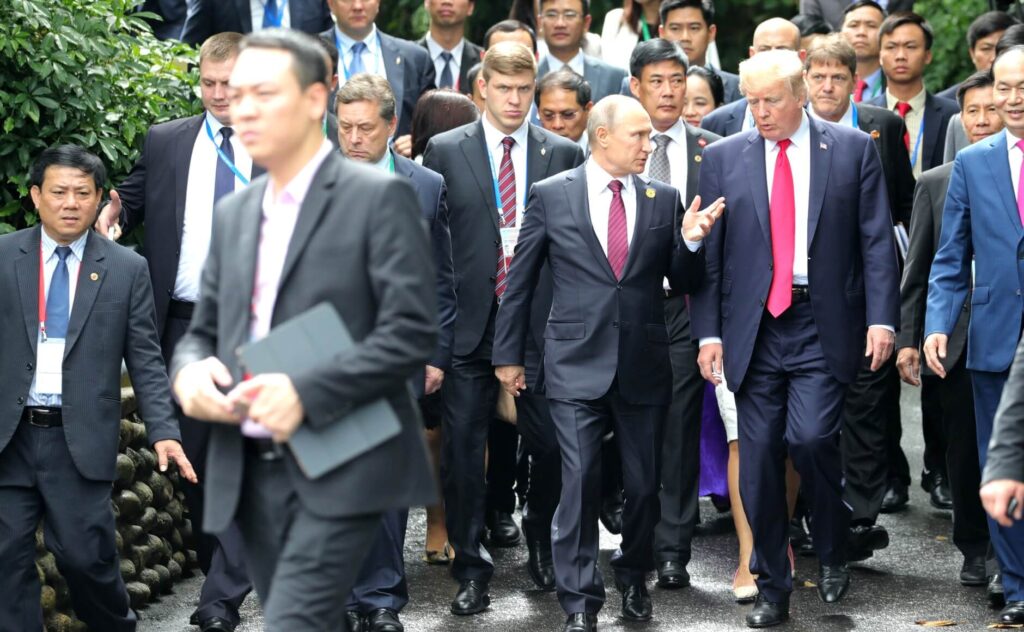by The Cowl Editor on November 16, 2017
Opinion

by Lela Biggus ’18
Opinion Staff
Last November’s resolve of grieving Democrats, “it’s only four years,” is not so comforting anymore. In the era of Trump, the United States will see its global economic dominance in sharp decline, with China already poised to take its place.
Expert Thomas Sanderson spoke during a Board of Programmers-sponsored lecture on Monday about his work researching sources of global threats and international conflict. Sanderson is an investigative researcher of terrorism and insurgency with the Center for Strategic & International Studies.
Sanderson, who has conducted research in 70 countries and encountered terrorists, traffickers, and insurgent movements, had plenty to share with attendees interested in international relations, political science, or global studies.
His 90-minute lecture was packed with riveting material and stories from the field. One point that Sanderson mentioned was particularly interesting: the U.S. is newly considered a threat to its own security and global economic dominance. A lot has happened in just this past week to confirm it.
Threat of nuclear conflict with North Korea is escalating—nothing new—but Trump’s regrettably phrased denouncements of Kim Jong-un in the past have not been beneficial in de-escalating international tensions.
The North Korean leader released a statement last week calling Trump a “destroyer of world peace and stability” who “begged for a nuclear war on the Korean peninsula,” during Trump’s recent trip to Asia.
While Kim Jong-un may have made a similar claim regardless of whether or not Trump previously called him a “little rocket man” on whose country he would unleash “fire and fury,” Trump’s unfiltered, emotional backlash subjects the world to unimaginable risk. Trump sent out another tweet on Saturday in his refined diplomatic fashion, calling Kim Jong-un “short and fat.”
After meeting President Xi Jinping of China in Beijing last week, President Trump praised the leader for enforcing United Nations sanctions on North Korea.
Trump also addressed the sizable U.S. trade deficit with China, saying China cannot be blamed for their trade practices before shaming past U.S. administrations for allowing the “out of control trade deficit to take place and to grow.”
Trump’s statement publicly highlighted U.S. weaknesses on trade with China at a time when U.S. economic dominance in the region is beginning to falter.
President Trump’s dramatic break with the Trans-Pacific Partnership in order to put “America First” also reflected a relinquishing of economic power to China. Pulling out of the TPP is harmful for the U.S. economy in the long term as U.S. dominance in Asia continues to slip.
Ironically, it was President Obama’s eagerness in negotiating the agreement that expanded its breadth from four countries—New Zealand, Chile, Singapore, and Brunei—to twelve: Japan, Malaysia, Vietnam, Singapore, Brunei, Australia, New Zealand, Canada, Mexico, Chile, Peru, and, until Trump, the U.S.
The proposed partnership, now excluding the U.S., is highly complex and controversial. It marked a major step in Obama’s “pivot to Asia” design. The deal excluded China in order to sway Asian economies towards the West and hinder China’s command of markets in the region.
A free-trade agreement with labor competitive Asia-Pacific countries may have driven down U.S. wages and employment in certain manufacturing industries. The fact remains, however, that the TPP would have curtailed Chinese control of the region by decreasing Asian countries’ economic dependency on China. Negotiations on the TPP are proceeding without the U.S.—despite strong consensus that it would fall apart—with the Vietnamese Trade Minister commenting that members have now “overcome the hardest part.”
As Sanderson pointed out, the American economic system is the playing field on which the global economy has had to operate, but it does not have to stay that way.
The dollar has been the popular global currency since the abandonment of the gold standard and the 1944 Bretton Woods agreements, but a shift towards other powerful Asian currencies is certainly possible.
Trump may be socially conservative, but he is not so in terms of fiscal policy. By putting “America First,” he has foolishly enflamed tensions with North Korea and rejected a trade policy that would have secured U.S. economic influence in Asia.